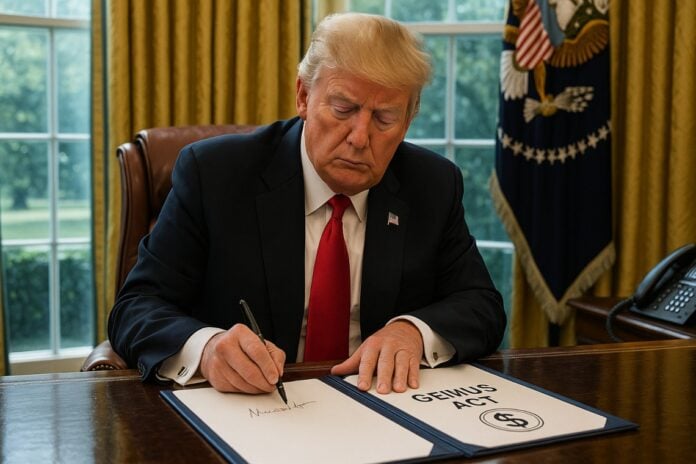The signing of the GENIUS Act by President Trump, scheduled for Friday at 2:30 PM in Washington, represents a turning point for the regulation of stablecoins in the United States.
A new regulatory framework, with evident benefits, constraints, and risks, that will change the market and operators starting from the next 18 months.
Summary
What the GENIUS Act on stablecoins provides: the key points of the new law
The GENIUS Act (“Guiding and Establishing National Innovation for US Stablecoins Act”) provides detailed regulations on who can issue stablecoins and with what obligations. Approved by a majority in the United States House last Thursday, the text has already been validated by the Senate and now awaits only formal promulgation by Trump. Once signed, the text will come into effect after 18 months, or 120 days after the issuance of the final rules by federal regulators such as the Treasury and Federal Reserve, if earlier.
APPROVATO: Il GENIUS Act creerà un chiaro quadro normativo per le stablecoin, permettendo agli innovatori di asset di prosperare negli Stati Uniti, portando il nostro sistema di pagamento nel 21° secolo e preservando il dominio del dollaro come valuta di riserva mondiale.
— Tom Emmer (@GOPMajorityWhip) 17 luglio 2025
Una vittoria enorme! pic.twitter.com/f9Wg4l8myx
Logan Payne, legal expert at Winston & Strawn, summarizes it this way: the regulation strongly encourages issuers of stablecoin to obtain a banking license. Operators who wish to offer services at the federal level will therefore need to transform into banks, trusts, or certified credit unions, confining their activity to the sole issuance of stablecoin. However, companies that intend to engage in other activities as well will need to aim for a federal trust bank license with the OCC (Office of the Comptroller of the Currency), following the example of Circle and Ripple.
Stablecoin issuers: obligation of banking license and publication of reserves
The main innovations for stablecoin issuers are structured on two fronts:
- Banking/trust license requirement: to issue stablecoins at the federal level, it will be necessary to become a bank, credit union, or federal trust, or be subject to the regulation of a State, but only if the volume of tokens issued remains below 10 billion dollars.
- Absolute transparency on reserves: the law requires maintaining a 1:1 ratio between stablecoins in circulation and reserves in US dollars (or similar instruments like Treasury bills). Each issuer must publish the detailed composition of the reserves monthly and submit them to independent review by an auditor, certifying the reports with state or federal authorities.
As a result, foreign operators who intend to offer stablecoin in the US market will also have to comply with these requirements, including maintaining reserves in accounts at US financial institutions.
Foreign and unapproved stablecoins: who will be excluded from the USA market?
The GENIUS Act introduces a restrictive criterion for market access for issuers not recognized by the American regulatory framework.
Three years after the entry into force, in the United States, the offering of stablecoins issued by unauthorized entities or those not registered with the OCC will be prohibited.
In practice, every offshore stablecoin token – to be marketed in the USA – will have to meet all the conditions set by the regulation: license, transparency on reserves, and formal registration.
Prohibition on offering interest on stablecoins: stop to returns for users
One of the most controversial innovations imposed by the GENIUS Act is the prohibition of offering interest or returns to stablecoin users, even if regulated or domiciled in the United States. This measure severely impacts one of the main marketing tools of the sector, used by various operators – including Circle with USDC – to attract and retain users.
According to Logan Payne, the move will inevitably lead to a renegotiation of the contractual terms already in place for users who currently hold remunerated stablecoins. The operation of crypto platforms in the United States, therefore, will undergo a significant reduction in terms of commercial appeal.
What are the consequences for decentralized finance (DeFi) and other crypto platforms?
A lot of uncertainty revolves around the application of the GENIUS Act’s rules concerning DeFi. The legislator has explicitly indicated that further measures and more detailed regulation will be necessary: the next step could be the CLARITY Act, aimed at clearly classifying the different types of digital assets and the competencies of the regulators.
In the meantime, the risk for decentralized platforms is significant: they will have to figure out how to manage stablecoin according to the new rules, while waiting for more certain guidelines. The regulatory future for decentralized finance thus remains open and potentially subject to rapid evolutions.
Timing of implementation: when will the new rules on stablecoins come into effect?
- The law will apply 18 months after Trump’s signing, unless the Treasury and Federal Reserve publish the implementing rules earlier, in which case the term is reduced to 120 days from publication.
- The restrictions on foreign and unapproved stablecoins, however, come into effect 36 months (3 years) after the entry into force, giving current entities technical time to adapt or exit the US market.
What happens now: impacts, scenarios, and what users and operators can do
The final approval of the GENIUS Act establishes for the first time clear federal rules for the stablecoin segment in the United States, bringing transparency and regulatory security but also strong limits to innovation and the more aggressive offerings of the crypto market. Issuers will have to decide whether to adapt, giving up high-yield products and adopting the banking structure, or target more permissive markets abroad.
For users, especially holders of stablecoins like USDC, the way of using these assets will change: no more interest or incentives, much more transparency but less economic appeal. However, the game remains open for DeFi, in search of regulatory certainty and new solutions.
The future depends on how the sector and the authorities will interpret and apply these rules. Everything can change in the coming weeks, when the implementing regulations will arrive and the crypto community will make its voice heard. Follow the updates and be prepared to adapt your strategy.


